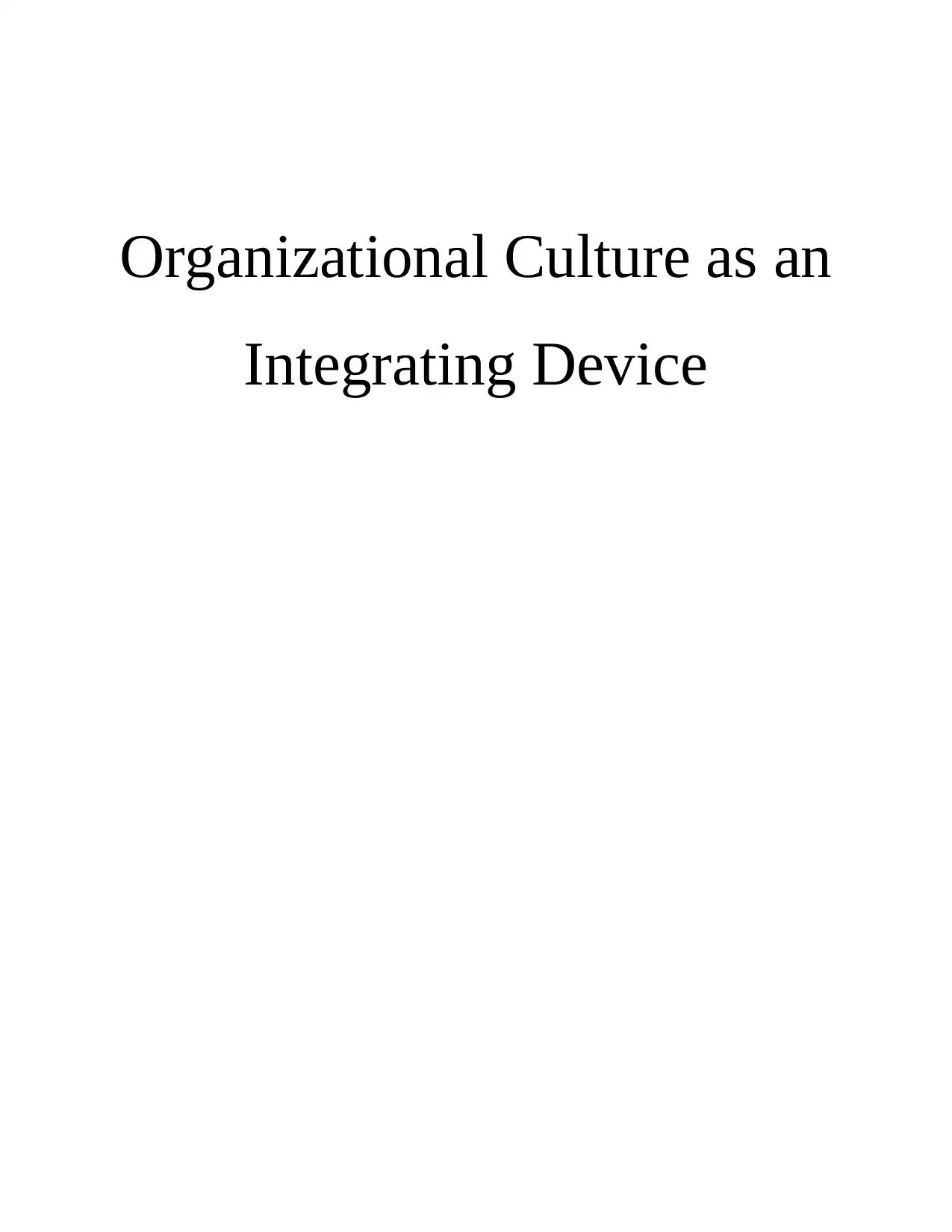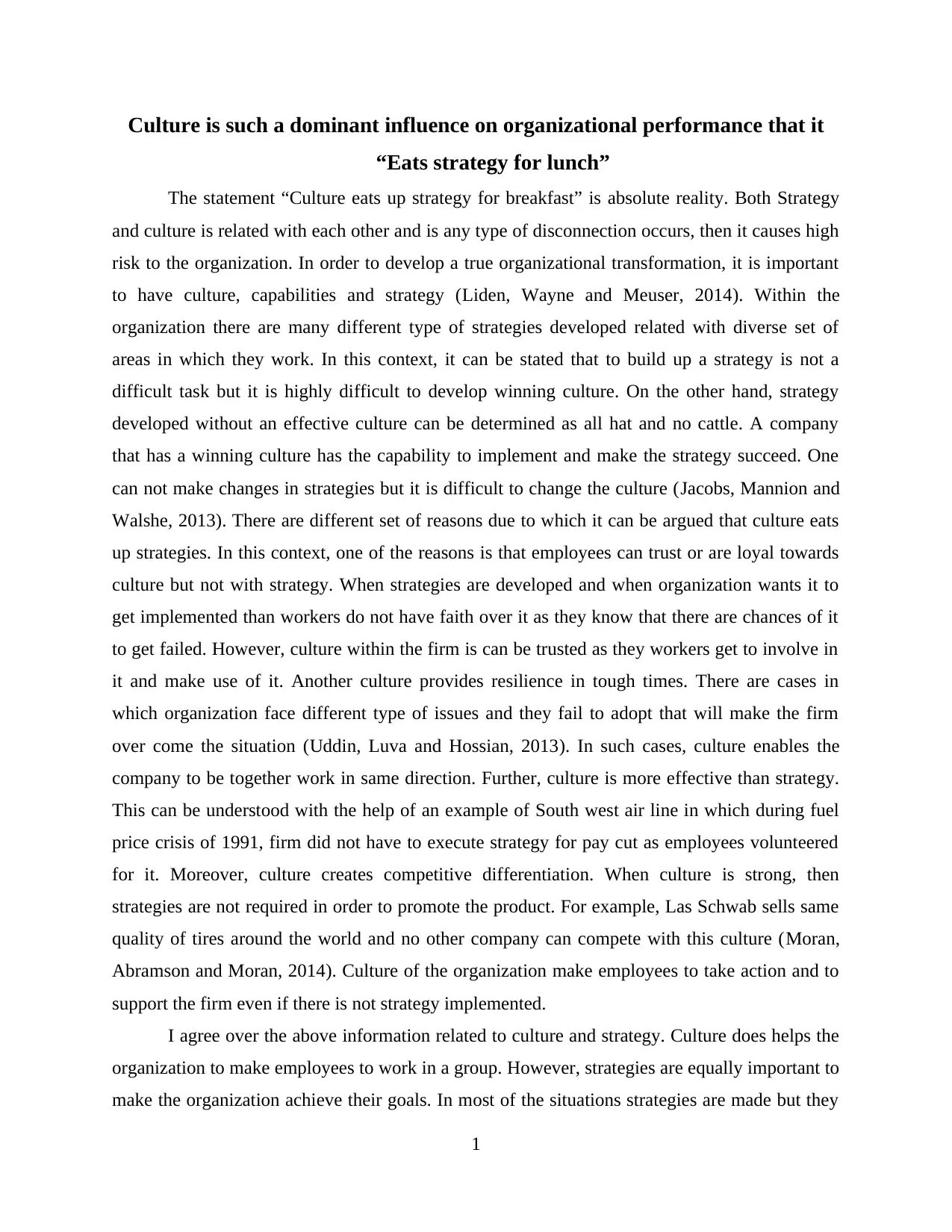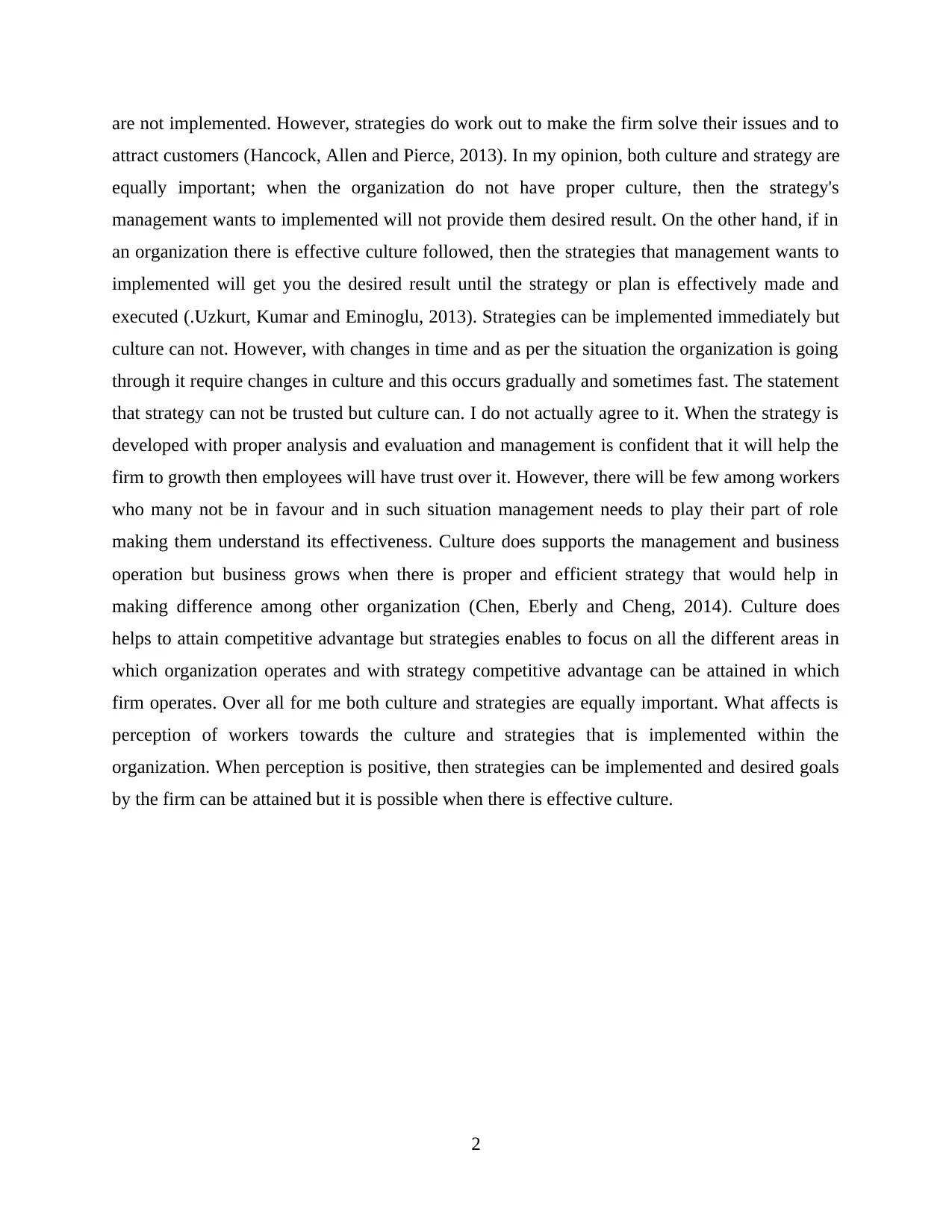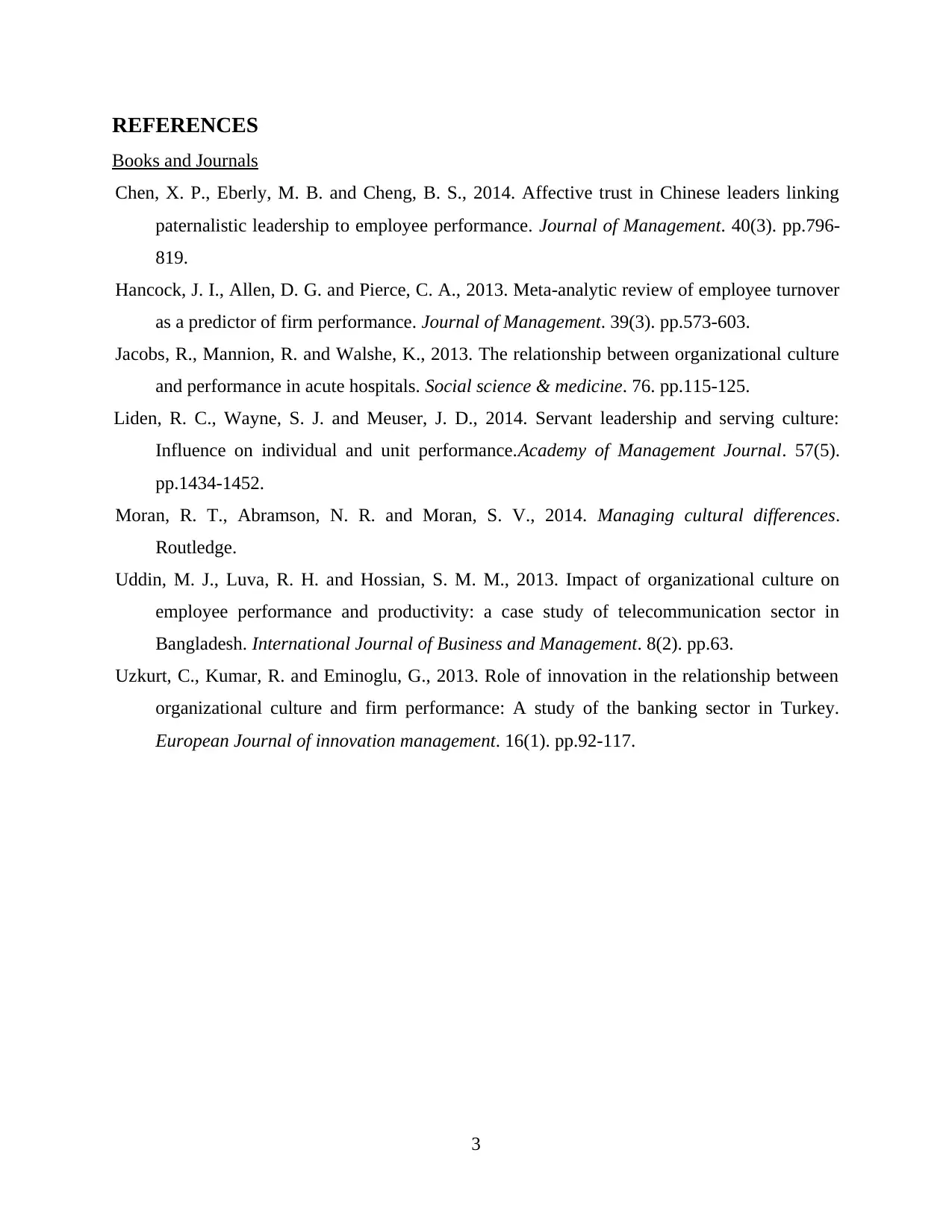Organizational Culture as an Integrating Device: Strategy Debate
VerifiedAdded on 2020/02/03
|4
|1189
|237
Essay
AI Summary
This essay examines the interplay between organizational culture and strategy, arguing that culture significantly impacts organizational performance, often overshadowing strategy. It explores the concept that "culture eats strategy for lunch," highlighting that a strong, trusted culture can foster employee loyalty and resilience during challenging times, and create competitive differentiation. The essay uses examples like Southwest Airlines and Les Schwab to illustrate culture's effectiveness. It acknowledges the importance of strategy but emphasizes that effective culture is crucial for successful strategy implementation and achieving desired organizational goals. The essay also discusses the evolving nature of culture and the importance of positive employee perceptions towards both culture and strategy for optimal results, referencing various academic sources to support its claims.

Organizational Culture as an
Integrating Device
Integrating Device
Paraphrase This Document
Need a fresh take? Get an instant paraphrase of this document with our AI Paraphraser

Culture is such a dominant influence on organizational performance that it
“Eats strategy for lunch”
The statement “Culture eats up strategy for breakfast” is absolute reality. Both Strategy
and culture is related with each other and is any type of disconnection occurs, then it causes high
risk to the organization. In order to develop a true organizational transformation, it is important
to have culture, capabilities and strategy (Liden, Wayne and Meuser, 2014). Within the
organization there are many different type of strategies developed related with diverse set of
areas in which they work. In this context, it can be stated that to build up a strategy is not a
difficult task but it is highly difficult to develop winning culture. On the other hand, strategy
developed without an effective culture can be determined as all hat and no cattle. A company
that has a winning culture has the capability to implement and make the strategy succeed. One
can not make changes in strategies but it is difficult to change the culture (Jacobs, Mannion and
Walshe, 2013). There are different set of reasons due to which it can be argued that culture eats
up strategies. In this context, one of the reasons is that employees can trust or are loyal towards
culture but not with strategy. When strategies are developed and when organization wants it to
get implemented than workers do not have faith over it as they know that there are chances of it
to get failed. However, culture within the firm is can be trusted as they workers get to involve in
it and make use of it. Another culture provides resilience in tough times. There are cases in
which organization face different type of issues and they fail to adopt that will make the firm
over come the situation (Uddin, Luva and Hossian, 2013). In such cases, culture enables the
company to be together work in same direction. Further, culture is more effective than strategy.
This can be understood with the help of an example of South west air line in which during fuel
price crisis of 1991, firm did not have to execute strategy for pay cut as employees volunteered
for it. Moreover, culture creates competitive differentiation. When culture is strong, then
strategies are not required in order to promote the product. For example, Las Schwab sells same
quality of tires around the world and no other company can compete with this culture (Moran,
Abramson and Moran, 2014). Culture of the organization make employees to take action and to
support the firm even if there is not strategy implemented.
I agree over the above information related to culture and strategy. Culture does helps the
organization to make employees to work in a group. However, strategies are equally important to
make the organization achieve their goals. In most of the situations strategies are made but they
1
“Eats strategy for lunch”
The statement “Culture eats up strategy for breakfast” is absolute reality. Both Strategy
and culture is related with each other and is any type of disconnection occurs, then it causes high
risk to the organization. In order to develop a true organizational transformation, it is important
to have culture, capabilities and strategy (Liden, Wayne and Meuser, 2014). Within the
organization there are many different type of strategies developed related with diverse set of
areas in which they work. In this context, it can be stated that to build up a strategy is not a
difficult task but it is highly difficult to develop winning culture. On the other hand, strategy
developed without an effective culture can be determined as all hat and no cattle. A company
that has a winning culture has the capability to implement and make the strategy succeed. One
can not make changes in strategies but it is difficult to change the culture (Jacobs, Mannion and
Walshe, 2013). There are different set of reasons due to which it can be argued that culture eats
up strategies. In this context, one of the reasons is that employees can trust or are loyal towards
culture but not with strategy. When strategies are developed and when organization wants it to
get implemented than workers do not have faith over it as they know that there are chances of it
to get failed. However, culture within the firm is can be trusted as they workers get to involve in
it and make use of it. Another culture provides resilience in tough times. There are cases in
which organization face different type of issues and they fail to adopt that will make the firm
over come the situation (Uddin, Luva and Hossian, 2013). In such cases, culture enables the
company to be together work in same direction. Further, culture is more effective than strategy.
This can be understood with the help of an example of South west air line in which during fuel
price crisis of 1991, firm did not have to execute strategy for pay cut as employees volunteered
for it. Moreover, culture creates competitive differentiation. When culture is strong, then
strategies are not required in order to promote the product. For example, Las Schwab sells same
quality of tires around the world and no other company can compete with this culture (Moran,
Abramson and Moran, 2014). Culture of the organization make employees to take action and to
support the firm even if there is not strategy implemented.
I agree over the above information related to culture and strategy. Culture does helps the
organization to make employees to work in a group. However, strategies are equally important to
make the organization achieve their goals. In most of the situations strategies are made but they
1

are not implemented. However, strategies do work out to make the firm solve their issues and to
attract customers (Hancock, Allen and Pierce, 2013). In my opinion, both culture and strategy are
equally important; when the organization do not have proper culture, then the strategy's
management wants to implemented will not provide them desired result. On the other hand, if in
an organization there is effective culture followed, then the strategies that management wants to
implemented will get you the desired result until the strategy or plan is effectively made and
executed (.Uzkurt, Kumar and Eminoglu, 2013). Strategies can be implemented immediately but
culture can not. However, with changes in time and as per the situation the organization is going
through it require changes in culture and this occurs gradually and sometimes fast. The statement
that strategy can not be trusted but culture can. I do not actually agree to it. When the strategy is
developed with proper analysis and evaluation and management is confident that it will help the
firm to growth then employees will have trust over it. However, there will be few among workers
who many not be in favour and in such situation management needs to play their part of role
making them understand its effectiveness. Culture does supports the management and business
operation but business grows when there is proper and efficient strategy that would help in
making difference among other organization (Chen, Eberly and Cheng, 2014). Culture does
helps to attain competitive advantage but strategies enables to focus on all the different areas in
which organization operates and with strategy competitive advantage can be attained in which
firm operates. Over all for me both culture and strategies are equally important. What affects is
perception of workers towards the culture and strategies that is implemented within the
organization. When perception is positive, then strategies can be implemented and desired goals
by the firm can be attained but it is possible when there is effective culture.
2
attract customers (Hancock, Allen and Pierce, 2013). In my opinion, both culture and strategy are
equally important; when the organization do not have proper culture, then the strategy's
management wants to implemented will not provide them desired result. On the other hand, if in
an organization there is effective culture followed, then the strategies that management wants to
implemented will get you the desired result until the strategy or plan is effectively made and
executed (.Uzkurt, Kumar and Eminoglu, 2013). Strategies can be implemented immediately but
culture can not. However, with changes in time and as per the situation the organization is going
through it require changes in culture and this occurs gradually and sometimes fast. The statement
that strategy can not be trusted but culture can. I do not actually agree to it. When the strategy is
developed with proper analysis and evaluation and management is confident that it will help the
firm to growth then employees will have trust over it. However, there will be few among workers
who many not be in favour and in such situation management needs to play their part of role
making them understand its effectiveness. Culture does supports the management and business
operation but business grows when there is proper and efficient strategy that would help in
making difference among other organization (Chen, Eberly and Cheng, 2014). Culture does
helps to attain competitive advantage but strategies enables to focus on all the different areas in
which organization operates and with strategy competitive advantage can be attained in which
firm operates. Over all for me both culture and strategies are equally important. What affects is
perception of workers towards the culture and strategies that is implemented within the
organization. When perception is positive, then strategies can be implemented and desired goals
by the firm can be attained but it is possible when there is effective culture.
2
⊘ This is a preview!⊘
Do you want full access?
Subscribe today to unlock all pages.

Trusted by 1+ million students worldwide

REFERENCES
Books and Journals
Chen, X. P., Eberly, M. B. and Cheng, B. S., 2014. Affective trust in Chinese leaders linking
paternalistic leadership to employee performance. Journal of Management. 40(3). pp.796-
819.
Hancock, J. I., Allen, D. G. and Pierce, C. A., 2013. Meta-analytic review of employee turnover
as a predictor of firm performance. Journal of Management. 39(3). pp.573-603.
Jacobs, R., Mannion, R. and Walshe, K., 2013. The relationship between organizational culture
and performance in acute hospitals. Social science & medicine. 76. pp.115-125.
Liden, R. C., Wayne, S. J. and Meuser, J. D., 2014. Servant leadership and serving culture:
Influence on individual and unit performance.Academy of Management Journal. 57(5).
pp.1434-1452.
Moran, R. T., Abramson, N. R. and Moran, S. V., 2014. Managing cultural differences.
Routledge.
Uddin, M. J., Luva, R. H. and Hossian, S. M. M., 2013. Impact of organizational culture on
employee performance and productivity: a case study of telecommunication sector in
Bangladesh. International Journal of Business and Management. 8(2). pp.63.
Uzkurt, C., Kumar, R. and Eminoglu, G., 2013. Role of innovation in the relationship between
organizational culture and firm performance: A study of the banking sector in Turkey.
European Journal of innovation management. 16(1). pp.92-117.
3
Books and Journals
Chen, X. P., Eberly, M. B. and Cheng, B. S., 2014. Affective trust in Chinese leaders linking
paternalistic leadership to employee performance. Journal of Management. 40(3). pp.796-
819.
Hancock, J. I., Allen, D. G. and Pierce, C. A., 2013. Meta-analytic review of employee turnover
as a predictor of firm performance. Journal of Management. 39(3). pp.573-603.
Jacobs, R., Mannion, R. and Walshe, K., 2013. The relationship between organizational culture
and performance in acute hospitals. Social science & medicine. 76. pp.115-125.
Liden, R. C., Wayne, S. J. and Meuser, J. D., 2014. Servant leadership and serving culture:
Influence on individual and unit performance.Academy of Management Journal. 57(5).
pp.1434-1452.
Moran, R. T., Abramson, N. R. and Moran, S. V., 2014. Managing cultural differences.
Routledge.
Uddin, M. J., Luva, R. H. and Hossian, S. M. M., 2013. Impact of organizational culture on
employee performance and productivity: a case study of telecommunication sector in
Bangladesh. International Journal of Business and Management. 8(2). pp.63.
Uzkurt, C., Kumar, R. and Eminoglu, G., 2013. Role of innovation in the relationship between
organizational culture and firm performance: A study of the banking sector in Turkey.
European Journal of innovation management. 16(1). pp.92-117.
3
1 out of 4
Related Documents
Your All-in-One AI-Powered Toolkit for Academic Success.
+13062052269
info@desklib.com
Available 24*7 on WhatsApp / Email
![[object Object]](/_next/static/media/star-bottom.7253800d.svg)
Unlock your academic potential
Copyright © 2020–2025 A2Z Services. All Rights Reserved. Developed and managed by ZUCOL.





